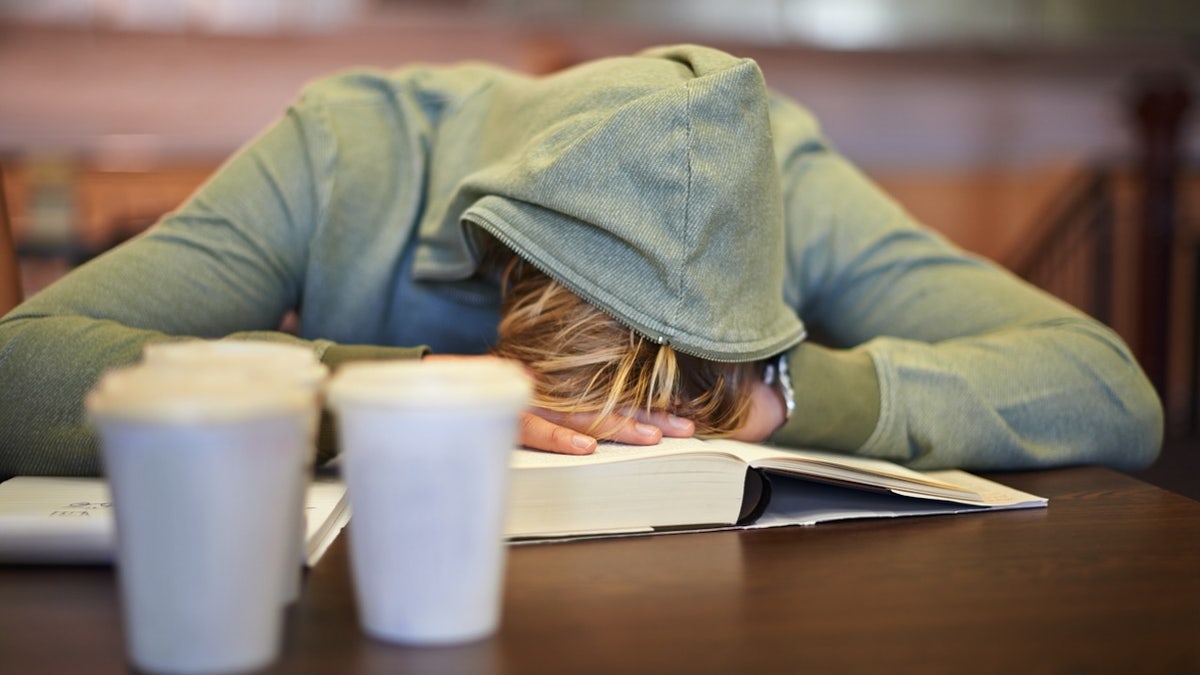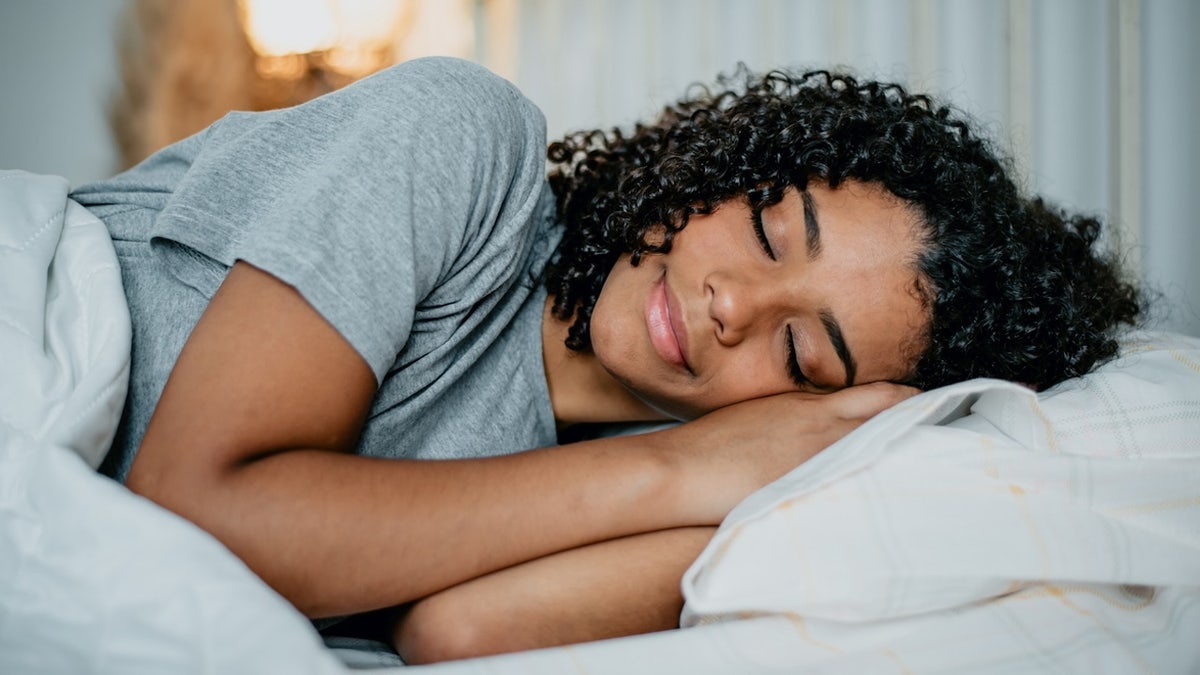Get better sleep without taking melatonin
Made a resolution to get more sleep? Lifestyle expert Jené Luciani-Sena joins 'Fox & Friends Weekend' to share tips on how to get better sleep.
Teens should be getting between eight and 10 hours of sleep every night, experts say — yet a vast majority of them are falling short.
The 2024 Sleep in America Poll from the National Sleep Foundation (NSF), which is headquartered in Washington, D.C., found that 80% of teens don't get enough sleep — and the typical teen scored a failing grade of "F" in terms of practicing healthy sleep behaviors.
Teens also reported that when they get insufficient sleep, their mental and emotional health suffers.
IMPROVE YOUR SLEEP BY OPTIMIZING 6 BIOMARKERS: ‘INTEGRAL TO HEALTH’
The poll compiled sleep data from a variety of indexes and questionnaires conducted by NSF, as well as the PHQ-9 (patient health questionnaire) to gauge teens’ depressive symptoms.
Here's a deeper dive into the issue.

Teens should get between eight and 10 hours of sleep each night, experts say — yet a vast majority of them are falling short. (iStock)
Why are teens so sleep-deprived?
Teens face many challenges in getting a healthy amount of sleep, according to Dr. Joseph Dzierzewski, PhD, vice president of research and scientific affairs at NSF, who was one of the researchers working on the study.
"Those [challenges] include school schedules and demands, extracurricular activities, social commitments, employment responsibilities and the constant lure of electronic content, to name a few," he told Fox News Digital.
ALWAYS FEELING TIRED? EXPERTS SHARE 4 COMMON CAUSES OF DAYTIME FATIGUE
School demands and activities are one of the biggest sleep blockers, the poll found.
Teens are nearly half as likely to get the recommended eight to 10 hours of sleep on school nights compared to weekends, and they are more than three times as likely to be dissatisfied with the amount of sleep they get on school nights compared to weekends.
Link between sleep and mental health
There is a two-way connection between sleep health and mental health, Dzierzewski noted.
"Poor sleep health can lead to depressive symptoms, and depressive symptoms can lead to poor sleep health," he said.

Teens are nearly half as likely to get the recommended eight to 10 hours of sleep on school nights compared to weekends, a new study found. (iStock)
Teens who don’t get the recommended amount of sleep on school nights, who have difficulty falling or staying asleep, or who are dissatisfied with their sleep have higher levels of depressive symptoms, the poll found.
Dr. Zaid Fadul, the Arizona-based medical director at Better U, an online mental health provider, said he's struck by the "clear connection" between sleep health and mental well-being in teenagers, which he said he's observed in his own practice.
"It's deeply concerning that such a significant portion of teens are not getting the sleep they need, which undoubtedly impacts their academic performance, emotional health and overall quality of life," Fadul, who was not involved in the NSF findings, told Fox News Digital.
Lack of sleep can contribute to feelings of sadness, hopelessness and disinterest in activities once enjoyed, the doctor noted.
It can also affect concentration, decision-making, and memory, leading to decreased academic performance and increased stress.

Teens should prioritize slumber with a consistent, relaxing wind-down routine while keeping a regular sleep schedule, an expert said. (iStock)
Mood swings often come with poor sleep, Fadul said, as teens may experience more irritability, short temper and emotional volatility.
"Studies have also shown a link between sleep problems and suicidal ideation among adolescents," Fadul warned.
Tips for teens to improve sleep
The NSF recommends six small steps that can have a big impact on nighttime sleep.
During the day, teens should get some bright light, especially in the morning.
They should also exercise regularly and eat meals at consistent times daily, Dzierzewski said.
During the evening, teens should avoid caffeine and heavy meals before bedtime.
DEPRESSION AND ANXIETY MAY IMPACT YOUNG ADULTS TWICE AS MUCH AS TEENS, HARVARD SURVEY FINDS
They should also prioritize sleep with a consistent, relaxing wind-down routine while keeping a regular sleep schedule, Dzierzewski said.
In addition, teenagers should put devices away before bed and sleep in dark, quiet and cool spaces, according to the NSF’s guidance.
Families, schools and entire communities all play a part in supporting the sleep health of young people, Fadul noted.

Teens who don’t get the recommended amount of sleep on school nights, who have difficulty falling or staying asleep, or who are dissatisfied with their sleep have higher levels of depressive symptoms, new research found. (iStock)
"In my view, parents must be proactive in creating environments conducive to good sleep and in establishing routines that encourage healthier sleep habits, such as reducing screen time before bed," he said.
CLICK HERE TO SIGN UP FOR OUR HEALTH NEWSLETTER
"Moreover, I firmly believe that schools and community programs must align to promote better sleep practices among teenagers, potentially revisiting policies like school start times to better accommodate teens' biological clocks."

If sleep problems persist, an expert recommends speaking with a health care provider to explore possible underlying causes and treatment options. (iStock)
Sleep should be prioritized in the public health agenda, Fadul said.
"Health care professionals, educators and policymakers must unite to elevate sleep's priority," he said.
CLICK HERE TO GET THE FOX NEWS APP
"As both a clinician and a parent, I see the urgent need to rethink our approach to teen sleep health, ensuring that it's treated as the foundational aspect of mental well-being that it truly is."
If sleep problems persist, Fadul recommends speaking with a health care provider to explore possible underlying causes and treatment options.


